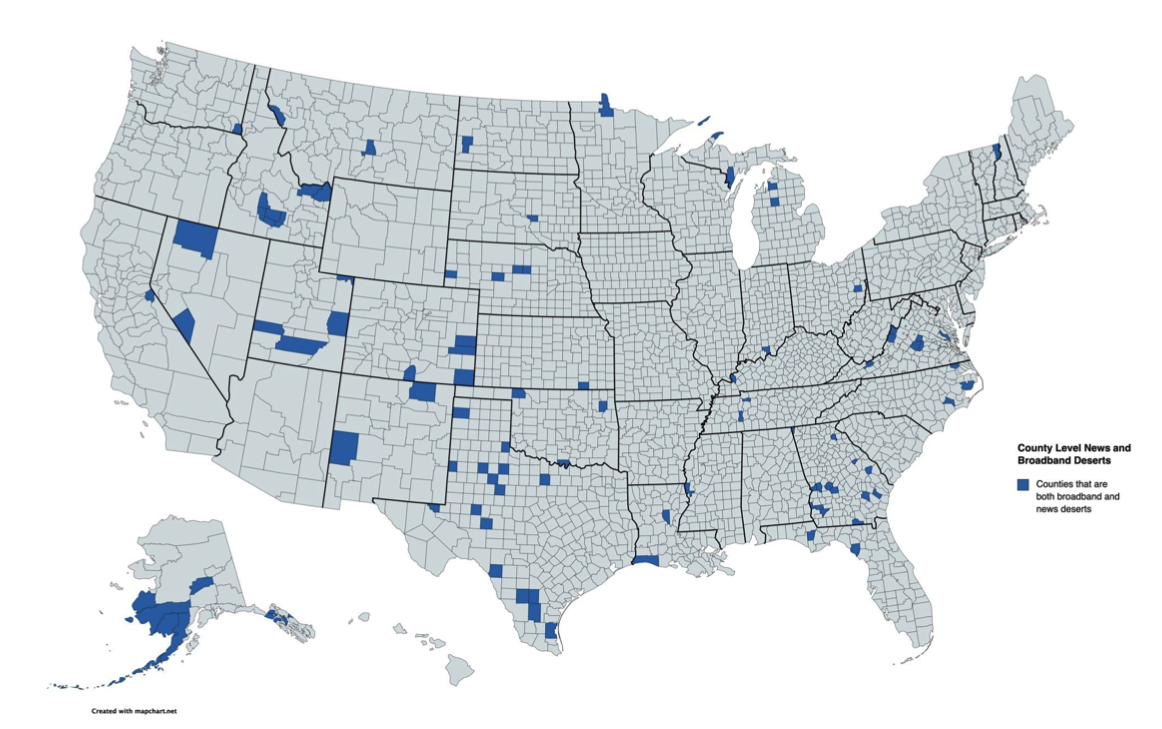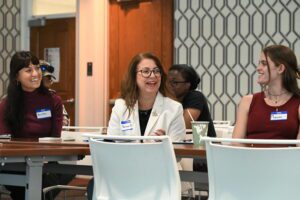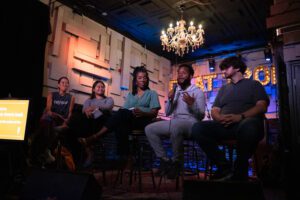By Catherine Komp,
NC Local Newsletter Editor
Many local news outlets have covered the digital divide, the need for better broadband access and the federal and state dollars going to connect homes and businesses to high speed internet.
But what about the other roles news organizations play in working toward digital equity?
The nonprofit Rebuild Local News sees local news as an indispensable player in these efforts. And they’ve been advocating for local news to be included in the digital equity plans that states are developing to qualify for billions in federal funding.
“You can solve that broadband problem. But if you don’t solve the local news problem, you’re not actually creating civic participants,” said Anna Brugmann, policy director of Rebuild Local News.
Without quality local news in these newly connected communities, you’re just building “high speed access to garbage,” as one policy expert told Rebuild Local News.
I had the chance to meet Anna at the LION Southeast News Sustainability Meetup and we reconnected this week to chat about the federal digital equity funding and what this might mean for local news and information organizations, including those in North Carolina.
She said digital equity “pulls the frame out” on broadband access to include not just the hardware, but also the skills, resources and information people need to be full participants in their communities.
“Where local news comes in is the participation part. You really can’t be a full participant in your economy, society, democracy or community if you don’t have credible journalism or credible information,” said Brugmann.
Rebuild Local News submitted a proposal to the US Department of Commerce last Spring to help state and federal officials understand the critical role of news organizations in digital equity. You can read the whole thing here, but they’ve also boiled down their arguments:
- We recommend that the Assistant Secretary include local news organizations as an entity that is “in the public interest and is not a school.” Doing so would both recognize the vital connection between local news and digital equity, and the role that local news organizations can play in fostering digital inclusion initiatives.
- Trusted community partners are eligible for grants under the $1.25 billion Digital Equity Competition Grant Program. We’re arguing that local news outlets, particularly those in areas struggling to provide equitable broadband, are important community connectors as well as themselves a component of digital equity
- Trusted community partners are eligible for grants under the $1.25 billion Digital Equity Competition Grant Program. We’re arguing that local news outlets, particularly those in areas struggling to provide equitable broadband, are important community connectors as well as themselves a component of digital equity
- Next, we recommend that local news initiatives should be included as eligible organizations to develop funded digital equity activities and projects.
- Because news outlets are a source of credible local information, they are natural allies to federal, state and local push for digital equity
- Because news outlets are a source of credible local information, they are natural allies to federal, state and local push for digital equity
- Third, we recommend that access to local news be included in state digital equity plans. Given the crucial importance of local news for civic engagement and participation, we also recommend that increased civic engagement be included as a metric of impact and success of certain digital equity programs.
- The Commerce Department is looking for guidance as to how to measure success of these programs. We believe that civic engagement should be a measured output
- Brugmann encourages news organizations to get familiar with their state plans. You can find North Carolina’s here and a searchable map of other states can be found here (scroll down). She says look for words like civic engagement, digital skills, credible information and trusted information partners.
“These are the kind of words that are being used. And when news organizations see them, they should see themselves in those words. They should not think that that’s just a library or a school, but that it can also be local newsrooms,” said Brugmann.
Local news providers in many rural areas are themselves underserved by broadband access, making it challenging to do all the essential work that requires connection. Brugmann says they’re advocating these organizations should be prioritized for high speed internet or grants to improve their digital presence “so when we build out [broadband] in these counties, there’s local journalism waiting for them.”
Rebuild Local News also commissioned research on broadband access in “news deserts,” finding nearly half of counties without a local news presence also lacked broadband access.
“What that points out is that this is a compounding problem and we’re not going to address digital equity, especially in these double deserts, if we don’t also take into consideration the quality of local information that exists in those places,” said Brugmann.
Brugmann says the “big dream” is to get more people to see local news as the central component to digital equity, especially in the “double deserts” and to funnel digital equity dollars into these locations to either fund full-time journalists to cover the issues there or even launch new newsrooms.
Rebuild Local News identified a few things North Carolina is doing that could also be considered as services of local news organizations, including grants for digital literacy and skills training; training and support of “digital navigators” serving the needs of older adults; and $14 million in funding for local digital inclusion projects.
“North Carolina is already doing digital literacy,” said Brugmann. “They’re working with community health workers, which is super important because community health workers go into folks’ homes. If they’re doing that with public health workers, reporters also talk to a lot of people and so they could also be a trusted partner in this. So that’s what I mean, if you don’t see yourself described in the digital equity plans, think creatively.”
Brugmann says many local news outlets already do digital literacy, it’s just known by a different name, “media literacy” or simply, “journalism.”
“There is an example of a newsroom in Alabama that went totally digital. And as it was going totally digital, it equipped its reporters with talking points to help folks troubleshoot how to now access the information online. That’s very close to something that broadband advocates call ‘digital navigators’ which is teaching folks how to be teachers of how to navigate digital learning environments. That’s very close. It’s not a huge stretch,” said Brugmann.
Brugmann says there is urgency on this, since state digital equity plans are being submitted to the federal government and the bulk of funding will be distributed beginning in 2024. But she stresses it’s not too late to make the case for local news to be part of the plans and suggests finding other partners invested in digital equity.
“We’re all moving towards the same goal. We just need to have more coordination and awareness of what other folks are doing. And so we’ll have guidance that’s geared for newsrooms to explain digital equity and one for digital equity folks to explain newsrooms and try to bridge that vernacular gap.”
Rebuild Local News aims to release its guidance for newsrooms and broadband advocates in the coming weeks and hopes it helps partners overcome this “vernacular barrier” and build a bridge between all the different players working toward digital equity.
Digital equity is just one of the solutions Rebuild Local News is pursuing as they advocate for public policies to support this new era of journalism and civic information. Learn more about their efforts, including support of federal legislation and state and local policies to support local news.
Want to get involved in how news organizations in NC could work toward digital equity? Get in touch with NC Local News Workshop Executive Director Shannan Bowen at sbowen5@elon.edu.





